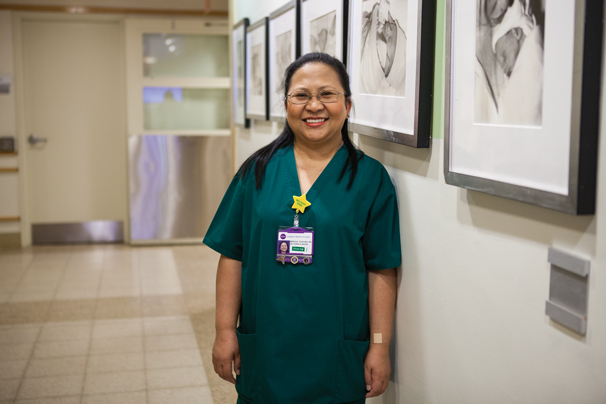
Monday, Oct. 29, was a normal night for NYU Langone Medical Center transport nurse Menchu Sanchez, even as hurricane-force winds funneled through the streets and 12-foot waves from the East River crashed against Manhattan’s coastline.
At 8 p.m., when lights went out after the hospital’s back-up generator failed, Sanchez and medical staff were at a crossroads. During a two-hour deliberation on how to transport the sickest baby in the hospital, a premature and ventilated infant with a rotten bowel, a confident nurse just shy of five feet tall took the lead.
“I told the doctors, ‘Can I hold the baby [on the way] down, I’m going to hold the baby down,’” Sanchez said. “They said, ‘No we cannot do that because it’s not allowed, that’s not the protocol.’ But then I said … ‘This is the only way we can bring the baby down safely and effectively.’”
Around 10 p.m., with several staff members, Sanchez began the descent down nine flights of stairs in total darkness with the baby cradled in her arms. While sirens sounded outside and weird smells permeated the stairwell air, medical doctor Hannaise Cruz pumped the baby’s oxygen bag while Dr. Martha Caprio recorded the baby’s breaths. Nurse manager of the 9 East Pediatrics unit Gail Geraghty walked down backwards to guide the team while medical students lined the stairwell with cell phones and flashlights to light the way.
“My other hand was looking for a way to walk because I wanted to balance myself and feel secure,” Sanchez said. “I’m thinking, if just one step that I miss, it’s going to mess up everything else because I have the baby with me.”
Sanchez made four trips that night, carefully moving ventilated babies and babies on feeder growers to nearby hospitals including Mount Sinai and St. Luke’s. Ambulance crews drove from Ohio and Chicago to assist during the storm, surviving on nothing but chips and crackers from vending machines. It wasn’t until the babies were placed in the arms of staff members at other hospitals and hooked to machines with power that Sanchez knew they were safe.
“She stands out as a leader,” Geraghty said. “Where someone else would have shied away from taking that responsibility, she was ready to go and wanted to be a part of it.”
Sanchez’s heroism that October night immediately caught the eye of President Barack Obama. On Tuesday, Feb. 12, she was invited to attend the 2013 State of the Union address for exemplifying American ideals of heroism. Addressing the need to end gun violence and the duty for Americans to look out for each other, Obama urged citizens to follow her lead.
“We should follow the example of a New York City nurse named Menchu Sanchez,” said President Barack Obama at his 2013 State of the Union address. “When Hurricane Sandy plunged her hospital into darkness, she wasn’t thinking about how her own home was faring. Her mind was on the 20 precious newborns in her care and the rescue plan she devised that kept them all safe.”
As Obama spoke her name to millions of Americans, Sanchez, who was seated between Michelle Obama and Dr. Jill Biden at the Capitol building, couldn’t feel anything but bliss. When the First Lady nudged and smiled down at her as the president said her name, Sanchez nudged and smiled back.
“My heart was so overwhelmed … I am so, so happy,” Sanchez said. “I did not realize he would give me that kind of mention. This is not just for me, it’s for the nurse [staff] as a whole.”
The conglomeration of creativity by the entire medical staff that night gave Sanchez and her fellow nurses the confidence they needed to transport 20 at-risk infants to safety. She displays the same perseverance she exudes at work with her own two kids.
“She’s outstanding,” said Judith Sanchez, Menchu’s husband. “I am like the third child … [She] helps the kids grow up the right way.”
Even though she describes her home in Secaucus, N.J., as a pigpen, a space with an unlivable first floor due to mass flooding that ruined her home, she says her life hasn’t changed.
“What had happened is probably meant to happen because … it’s just a regular thing to us. It happens everyday, saving lives,” Sanchez said. “This, being a hero, is in everybody’s heart, everybody can be a hero by just doing what is supposed to be done.”
A version of this article appeared in the Monday, Feb. 25 print edition. Kristina Bogos is features editor. Email her at [email protected].
























































































































































